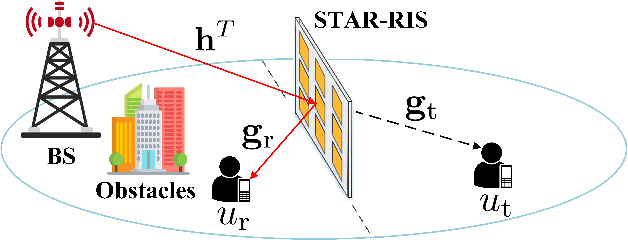Analytical Characterization of Coverage Regions for STAR-RIS-aided NOMA/OMA Communication Systems
Paper and Code
Jun 01, 2023

We provide an analytical characterization of the coverage region of simultaneously transmitting and reflecting reconfigurable intelligent surface (STAR-RIS)-aided two-user downlink communication systems. The cases of orthogonal multiple access (OMA) and non-orthogonal multiple access (NOMA) are considered, under the energy-splitting (ES) protocol. Results confirm that the use of STAR-RISs is beneficial to extend the coverage region, and that the use of NOMA provides a better performance compared to the OMA counterpart.
 Add to Chrome
Add to Chrome Add to Firefox
Add to Firefox Add to Edge
Add to Edge